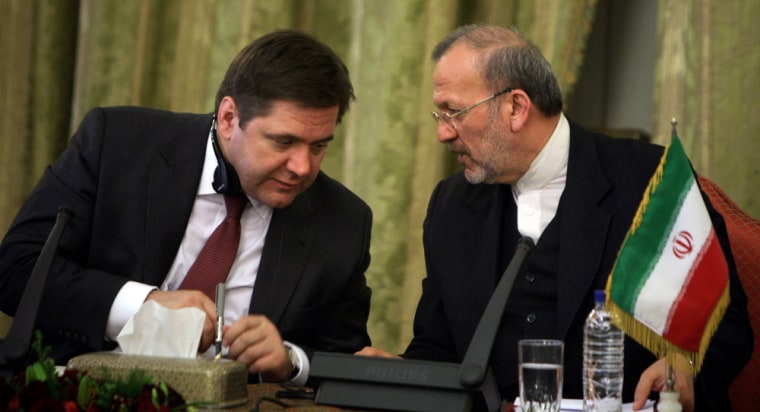Iran's announcement of plans to build 10 more uranium enrichment facilities is largely bluster after a strong rebuke from the U.N.'s nuclear agency, analysts said Monday. Nonetheless, the defiance is fueling calls among Western allies for new punitive sanctions to freeze Iran's nuclear program.
U.S. and European officials were swift to condemn the plans, warning that Iran risked sinking ever deeper into isolation. Iran responded that it felt forced to move forward with the plans after the International Atomic Energy Agency passed a resolution Friday demanding that it halt all enrichment activities.
Iran's bold announcement Sunday appears to be largely impossible to achieve as long as sanctions continue to throw up roadblocks and force Iran to turn to black markets and smuggling for nuclear equipment, said nuclear expert David Albright.
"They can't build those plants. There's no way," he said. "They have sanctions to overcome, they have technical problems. They have to buy things overseas ... and increasingly it's all illegal."
More drastic move ruled out
A more worrisome escalation in the standoff would be if Iran reduced its cooperation with the IAEA, as some Iranian officials have threatened to do if the West continues its pressure. The U.N. inspectors and monitoring are the world's only eyes on Tehran's program. The head of Iran's nuclear agency on Monday ruled out an even more drastic move, saying Tehran does not intend to withdraw from the Nuclear Non-Proliferation Treaty.
Enrichment is at the center of the standoff between Iran and the West because it can be used both to produce material needed for atomic weapons as well as fuel for nuclear power plants. Iran insists it only wants the latter.
New enrichment plants, on the scale of the one Iran already operates in the town of Natanz, would be extremely expensive, take years to build and would be difficult to stock with centrifuges and other necessary equipment while sanctions are in place, Albright said.
Further dimming the credibility of the plan, 10 new facilities on the scale of Natanz would put Iran in league with the production levels of any of Europe's major commercial enrichment suppliers, said Albright, president of the Washington-based Institute for Science and International Security.
"And also they don't have enough uranium. They would need a massive amount of uranium," he said.
A diplomat from one of the six world powers attempting to engage Iran on its nuclear program described the Iranian announcement as a "political move" with little immediate significance beyond demonstrating Tehran's defiance.
The diplomat, who follows the nuclear dossier the IAEA has gathered on Iran, noted that Tehran appears to have significant problems with its present enrichment program, to the point that it cannot even keep the centrifuges it has set up at Natanz running without breakdowns.
The diplomat demanded anonymity because he was not authorized to comment on the issue.
Decoy sites?
Still, the announcement is of major concern because it could signal an intention to put up numerous decoy sites to deceive the outside world, while building perhaps a few secret military enrichment sites on a small scale that could be put to use in weapons production if Tehran decides to do go down that path, Albright said.
Such concerns were heightened with the recent discovery that Iran had a second, previously unknown enrichment facility burrowed partway into a mountain near the holy city of Qom.
"I tend to think that this Qom site was probably meant to be a clandestine facility for breakout that they wanted built for nuclear weapons," said Albright. "And now that it's been exposed they may want to replace it."
Iran's announcement triggered calls for new penalties that Albright said could evolve into a "mini-cold war strategy" to further isolate and contain Iran while holding out a hand for negotiations.
‘A bit childish’
The United States' ambassador to the U.N., Susan Rice, said Iran's plans would be "completely inappropriate" and would further isolate it from the world.
In Paris, French Foreign Minister Bernard Kouchner called Iran's decision "a bit childish."
"Iran is playing an extremely dangerous game," Kouchner said on France's RTL radio Monday. "There's no coherence in all this, other than a gut reaction."
The French defense minister, Herve Morin, said the international community should "probably commit toward new economic sanctions against Iran."
Iran and the top powers at the U.N. are deadlocked over a U.N.-drafted proposal for Iran to send much of its enriched uranium abroad, which the West seeks because it would at least temporary leave Tehran unable to develop a nuclear bomb. So far Iran has balked at the offer. The unusually strong IAEA censure of Iran over enrichment was a sign of the West's growing impatience with its defiance.
‘West doesn't want to understand’
Iranian Vice President Ali Akbar Salehi, who heads the nuclear program, told state radio that the decision to build the new uranium enrichment facilities was necessary to respond to the resolution.
"We had no intention of building many facilities like the Natanz site, but apparently the West doesn't want to understand Iran's peaceful message," Salehi said.
Salehi said Iran would not go so far as to withdraw from the Nuclear Nonproliferation Treaty, under which Iran is subject to oversight by the U.N. nuclear agency.
"If we wanted to obtain nuclear weapons, we would have pulled out of NPT ... Iran doesn't want to withdraw from the treaty," the official IRNA news agency quoted him as saying Monday.
Iran's parliament speaker Ali Larijani insisted "a diplomatic opportunity" was still possible "under which Iran will continue its (nuclear) work under international surveillance."
But a day earlier, Larijani warned that Iran could reduce its cooperation with the IAEA if the West continues its pressure and doesn't compromise.
